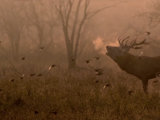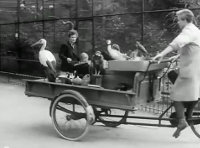Dutch nature documentary De Nieuwe Wildernis has managed to lure 400,000 people to the cinema in just a month, Vroege Vogels wrote last Monday.
 The documentary about wildlife in the Oostvaardersplassen (‘the lakes of those who sailed to the East’) was released on 26 September 2013. For feature films 400,000 visitors is considered pretty successful, but for a documentary it’s practically a miracle. As a comparison, last year Hollywood blockbuster The Hunger Games took the number 13 spot with 458,816 visitors.
The documentary about wildlife in the Oostvaardersplassen (‘the lakes of those who sailed to the East’) was released on 26 September 2013. For feature films 400,000 visitors is considered pretty successful, but for a documentary it’s practically a miracle. As a comparison, last year Hollywood blockbuster The Hunger Games took the number 13 spot with 458,816 visitors.
Part of the attraction of Ruben Smit’s De Nieuwe Wildernis may be that there is very little original nature left in the Netherlands. Biodiversity is at an all time low in this country, the Mean Species Abundance having dropped from 40% in 1900 to 15% in 2000. The average MSA for Europe is 40%.
The nature reserve Oostvaardersplassen came about by accident. It is situated on the north end of Flevoland, the largest artificial island in the world. Originally reclaimed in 1986, the area was to be bordered by another artificial island, Markerwaard, and intended for housing business parks, but in 1986 the national government decided not to build the extra island. With businesses also staying away, nature took over. In 1986 the area was designated a national nature reserve.
See also: Searching and capturing that elusive horse wind.
(Photo: crop from the video)

 In 1962 Dutch cinema’s golden child Bert Haanstra visited the zoo of Amsterdam, Artis, during a sun-filled period and filmed the visitors as they were laughing, yawning, scratching themselves, chatting and taking naps. Then he filmed animals doing the same thing and edited the result to contrast the two groups and perhaps to say “we are not that different, you and I”.
In 1962 Dutch cinema’s golden child Bert Haanstra visited the zoo of Amsterdam, Artis, during a sun-filled period and filmed the visitors as they were laughing, yawning, scratching themselves, chatting and taking naps. Then he filmed animals doing the same thing and edited the result to contrast the two groups and perhaps to say “we are not that different, you and I”. The Tokkie family is suing dictionary makers Van Dale—the Dutch Duden / Larousse / Webster / what-have-you—for 50,000 euro over the inclusion of their family name with the definition “anti-social behaviour.” The Tokkies are also suing weekly Revu
The Tokkie family is suing dictionary makers Van Dale—the Dutch Duden / Larousse / Webster / what-have-you—for 50,000 euro over the inclusion of their family name with the definition “anti-social behaviour.” The Tokkies are also suing weekly Revu  Photographer
Photographer